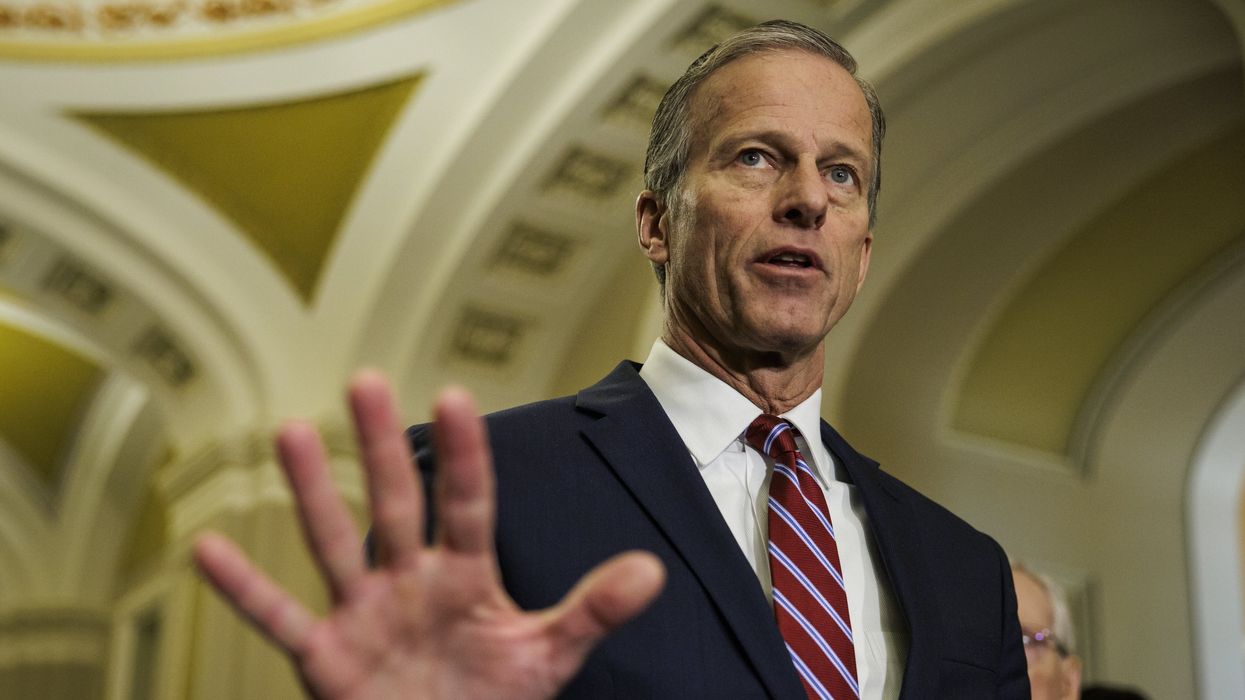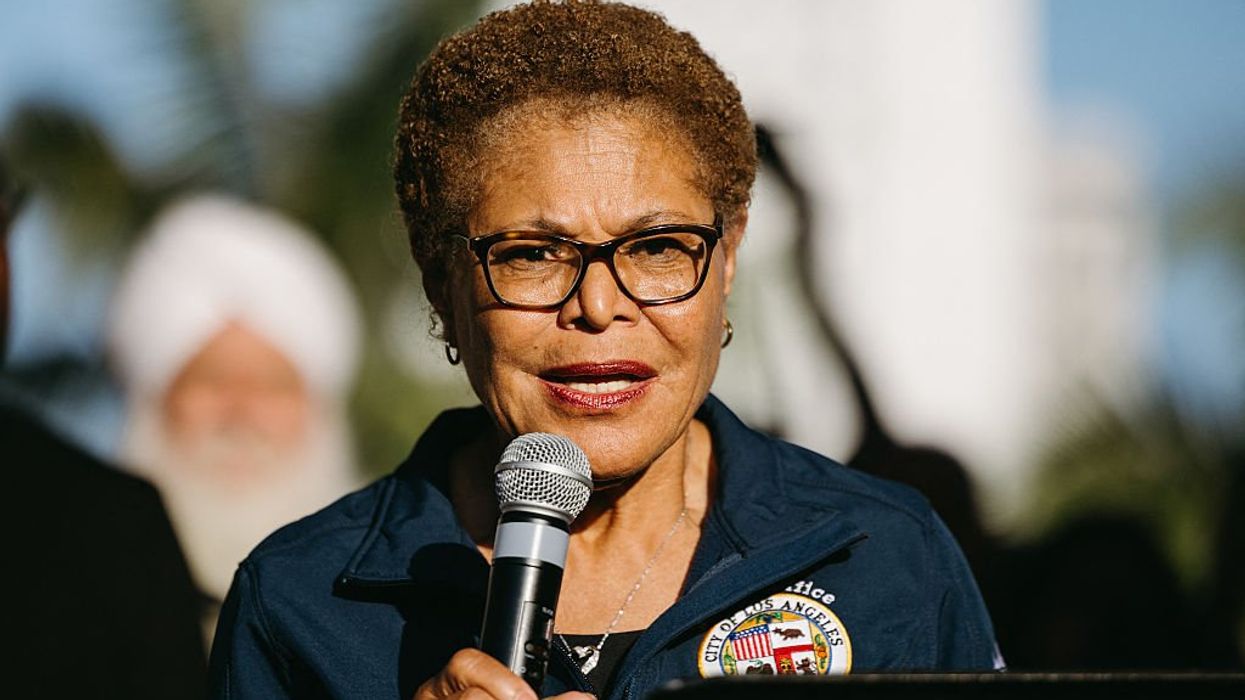
© 2025 Blaze Media LLC. All rights reserved.
Since we brought you news of the legal complaint filed against Catholic University alleging that Muslim students' rights are being violated as they pray in rooms featuring Christian images and symbols, the story has picked up national media attention. Last night on Fox News, host Sean Hannity's panel debated this "holy war being waged in our nation's capital." But Hannity and others are missing key facts in this case and, as a result, overlooking the real story.
When I first read about the human rights complaint allegedly filed on behalf of Muslim students at Catholic, I made the mistake of assuming that Muslim students were behind it. Only after personally speaking with the complaint filer -- George Washington University law professor John Banzhaf -- did I understand what this story was really all about. In fact, not a single Muslim student at Catholic University has signed on to Professor Banzhaf's complaint and he admitted to me that he lodged the complaint against Catholic with the D.C. Office of Human Rights as a concerned individual, not on behalf of any student or group of students.
In fact, Banzhaf sent a letter to the editor of the school's newspaper soliciting complainants on September 22, yet readily admits that none have have signed on to his case against the school.
“The community here is very respectful of other religions and I feel free to openly practice it,” Wiaam Al Salmi, a Muslim student at Catholic U who recently started the Arab American Association on campus told the school's student newspaper.
Additionally, Muslim enrollment at Catholic U (and Catholic universities across the country) has been on the rise.

"Because it is an overtly religious place, it's not strange or weird to care about your religion here, to pray and make God a priority," said [Catholic University student Reef Al-]Shabnan, a political science major who often covers her head with a pale beige scarf. "They have the same values we do."
It's this surge in enrollment, as reported by the Washington Post, which Banzhaf says initially piqued his curiosity in how the minority group was treated on campus.
Trolling for a complaint to file, Banzhaf admitted to me that he researched the university's policies and discovered that certain "accommodations" made for other religious groups on campus didn't seem to be extended to Muslims. "You can't hide behind a religious identity and claim that you're above the law," he says.
Another student wrote to the school's newspaper decrying Banzhaf's "absurd and irrational" complaint: "Such a mindless outburst does not deserve much attention and I applaud [Catholic University] President Garvey’s silence against this ridiculous accusation."
To understand the motives behind his complaint, it's important to understand exactly who Banzhaf is. Professor Banzhaf teaches a course at GWU on "legal activism" -- the practice of using legal maneuvers to drive social change. "While most lawyers see the law as a means of living, the legal activist looks to see what kinds of problems I'm interested in and how I can use legal activism as a weapon to address those problems," Banzhaf says.
In short, Banzhaf is an attorney who runs personal responsibility out of the courtroom, instead blaming McDonald's for obesity and cigarette companies for smokers' lung cancer. Check out the man's "sue the bastards" license plate:

His website reiterates his activist philosophy:
At the George Washington University Law School, Prof. John Banzhaf teaches Torts, Administrative Law, Disabled People and the Law, and Law and the Deaf. He also teaches a unique world-famous course — "Legal Activism", which has been dubbed "suing for credit" and "Sue the Bastards" — where his law students, which the press dubbed "Banzhaf's Bandits", learn to become public interest lawyers by bringing their own legal actions.
To receive a passing grade from the 40+-year professor, law students (dubbed "Banzhaf's Bandits" by TIME) are required to identify an area of social policy they want to change and to use the District of Columbia's uniquely liberal statutes to change it. Most other states acknowledge the fact that dry cleaning a woman's silk blouse is a more expensive operation than pressing a man's dress shirt. But Banzhaf has successfully sued in the District of Columbia, forcing dry cleaners to charge men and women the same price. Charging them different prices, according to Banzhaf, amounts to sex discrimination. (Ironically, the net effect of Banzhaf's law pursuits means more expensive dry cleaning for men.)
The District of Columbia's liberal legal structure also aids Banzhaf's pursuit of "justice" because it requires no real justification to file a complaint against an institution like Catholic University. In D.C., you don't have to be an affected party to file a complaint, nor do you have to present any evidence that any actual wrongdoing has occurred. The mere suggestion that Muslim students may be discriminated against is enough to get D.C. bureaucrats sniffing around on campus, searching for wrongdoing.
Banzhaf justifies his legal activist pursuit of justice by calling it "public interest law." But it truly only serves one interest: his own.
Anyone familiar with America's abused legal system knows that the mere threat of an expensive and time-consuming lawsuit is enough to force change at even the most stalwart institutions. For Banzhaf, his activist bent is a win-win: either the threat of a lawsuit forces the change he wants or he takes the case to court where an equally activist D.C. judge sympathizes with his misguided cause. As a result, justice is perverted and Banzhaf makes off like a bandit while others pay the price. (Expensive legal fees for Catholic U will undoubtedly mean higher tuition rates for students.)
But back to the unfolding pseudo-scandal at Catholic University...
I set out to write this follow-up post for a few key reasons -- the first was to expose Banzhaf and the motives behind this complaint, and secondly because the Muslim students attending Catholic University are getting a bad rap in all of this through no fault of their own. While I acknowledge that there are some Muslims in America today who would love to undermine traditional Christian institutions like Catholic U, there's no evidence surrounding the complaint leveled at the university to suggest that's what's going on here... yet.
While Banzhaf's complaint could easily spiral into a full-blown lawsuit supported by the likes of CAIR, it stands now as only the disgruntled complaint of a) a man not affiliated with Catholic University, who is b) (to my knowledge) not a Muslim. Instead, Banzhaf's personal campaign against so-called injustice and discrimination is only dividing people along religious lines where they weren't previously divided.
Bottom line: It's wrong to characterize this case as it currently stands as a complaint from intolerant Muslim students at Catholic University when in fact it's a complaint filed by a know-it-all from academia who thinks dividing people is the best way to unite them.
Want to leave a tip?
We answer to you. Help keep our content free of advertisers and big tech censorship by leaving a tip today.
Want to join the conversation?
Already a subscriber?
more stories
Sign up for the Blaze newsletter
By signing up, you agree to our Privacy Policy and Terms of Use, and agree to receive content that may sometimes include advertisements. You may opt out at any time.
Related Content
© 2025 Blaze Media LLC. All rights reserved.
Get the stories that matter most delivered directly to your inbox.
By signing up, you agree to our Privacy Policy and Terms of Use, and agree to receive content that may sometimes include advertisements. You may opt out at any time.





